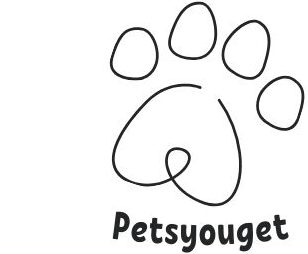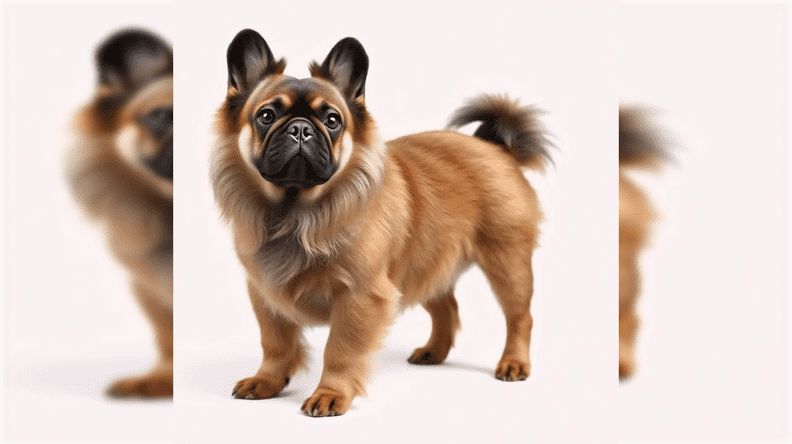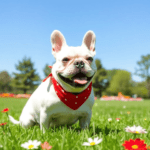Introduction
French Bulldogs are loved worldwide for their playful nature and compact size. While most are known for their short, smooth coats, a unique variation of the long-haired French Bulldog has recently captured the attention of dog lovers. With its longer, softer coat, this variation stands out from the standard French Bulldog.
As interest in long-haired French Bulldogs grows, many are curious about what makes them special. Whether you’re considering one as a pet or just want to learn more, this post covers everything you need to know. We’ll dive into the key traits of the long-haired French Bulldog, how it differs from the standard version, and what it takes to care for this charming breed.
What is a Long Haired French Bulldog?
A long-haired French Bulldog is a rare variation of the beloved French Bulldog, known for its longer, fluffier coat. Unlike the standard French Bulldog, which has a short, smooth coat, the long-haired variety features fur that can range from slightly wavy to noticeably longer, giving them a distinct, more fluffy appearance. This unique look has made them increasingly popular, although it’s important to note that long-haired French Bulldogs aren’t officially recognized by major breed standards, such as the American Kennel Club (AKC).
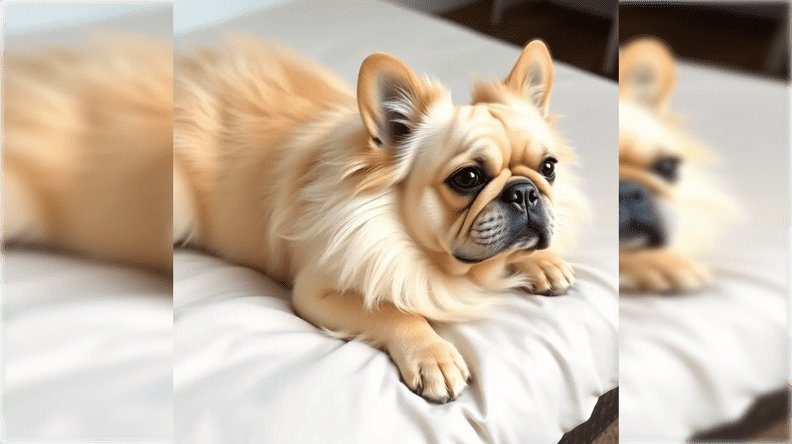
The long hair in French Bulldogs is caused by a mutation in the KRT71 gene, which affects keratin production the protein responsible for hair texture. This genetic trait results in longer fur compared to typical French Bulldogs. While any French Bulldog can carry the gene, it’s relatively rare and usually appears through selective breeding.
When it comes to appearance, long-haired French Bulldogs not only differ in coat length but also in texture. Their soft, fluffy fur gives them a unique look, and they require more grooming than their short-haired counterparts. Despite these grooming needs, long-haired French Bulldogs share the same compact, muscular build and playful, affectionate personality that make the breed so beloved.
Key Characteristics of Long Haired French Bulldogs
Appearance: Coat Texture, Length, and Color Variations
Long-haired French Bulldogs are easy to spot thanks to their soft, longer coats, which set them apart from the typical short-haired French Bulldog. Their fur can range from mildly wavy to fluffy, giving them a distinct, charming look. Some long-haired French Bulldogs have a slight wave, while others may have more pronounced, longer fur, especially around the neck and chest area.
In terms of color, long-haired French Bulldogs come in similar shades to their short-haired relatives, such as fawn, brindle, cream, and black. However, they can also feature rarer colors like blue or lilac. No matter the color, the defining trait of these dogs is the length and texture of their coat.
Size and Build: How They Compare to the Regular French Bulldog
Long-haired French Bulldogs share the same size and build as their short-haired counterparts. They are compact, sturdy dogs with a muscular frame, wide-set ears, and a distinct bat-like appearance. Typically, French Bulldogs weigh between 16 to 28 pounds and stand around 11 to 12 inches tall at the shoulder.
Although their coats may give them a slightly bulkier appearance, especially around the neck and chest, their size and shape remain consistent with the standard French Bulldog. They continue to maintain their playful, energetic nature and affectionate personality.
Personality Traits: Similarities and Differences in Temperament
When it comes to temperament, long-haired French Bulldogs are very similar to their short-haired relatives. Both are known for being affectionate, playful, and great companions. They are particularly good with children and love spending time with their families. French Bulldogs are also loyal, intelligent, and a bit stubborn, making them entertaining yet occasionally challenging to train.
Some owners believe long-haired French Bulldogs may be a bit more relaxed due to the grooming routine, but this difference is minimal. Both variations share a fun-loving, social, and sometimes mischievous personality.
Health and Grooming Needs: How Grooming Differs from Standard French Bulldogs
One of the main differences between long-haired and short-haired French Bulldogs is their grooming needs. While short-haired French Bulldogs require occasional brushing, long-haired French Bulldogs need more frequent grooming to prevent mats and tangles. To keep their coat in top condition, they should be brushed 3-4 times a week, or even daily depending on the coat’s length and texture.
Long-haired French Bulldogs may also need more regular baths, especially if their coat picks up dirt easily. Their longer fur can make them more prone to tangling, so using the right grooming tools, like a wide-toothed comb or slicker brush, is essential.
See also: French Bulldog Studs
Health-wise, long-haired French Bulldogs face the same issues as short-haired ones, including brachycephalic syndrome, hip dysplasia, and skin allergies. However, their longer coat can make them more susceptible to skin irritations or infections if not properly groomed, particularly in damp or matted areas. Regular grooming helps keep them comfortable and healthy.
How Rare Are Long Haired French Bulldog?
These adorable dogs are incredibly rare, which makes them even more desirable among dog lovers. While the standard breed is known for its distinctive short coat, the long-haired variety is a rare genetic variation that can appear in any litter. The genetic mutation responsible for their longer coats makes them uncommon, contributing to their high demand.
Rarity and Uniqueness
The long-haired variety is a unique variation of the breed, with only a small percentage around 1-5% carrying the genes for longer fur. This rarity drives up their popularity, with these dogs often fetching higher prices than their short-haired counterparts. Their distinct, fluffy coat and lovable personality make them a highly prized find for those seeking a companion animal.
Despite the growing interest, these dogs are still far from common. Their unique appearance and charming nature have caught the attention of many, but breeders still face challenges in producing them consistently.
Breeding Challenges
Breeding these rare dogs presents a few hurdles. The long hair is passed down through a recessive gene, meaning both parents must carry the gene for the trait to appear in their offspring. This makes intentional breeding for long fur much more difficult, as it requires careful genetic selection.
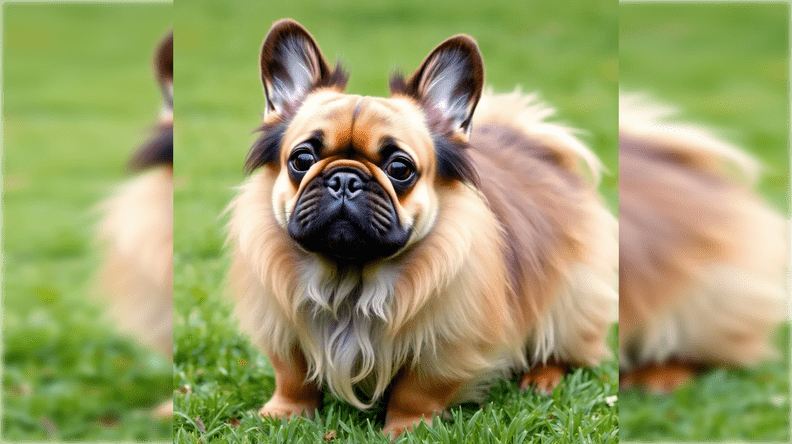
Moreover, breeders need to consider potential health concerns, such as brachycephalic syndrome, common in the breed. While selective breeding aims to maintain the long coat, it can sometimes worsen existing health issues. These challenges add both complexity and cost to the breeding process.
Additionally, long-haired variations aren’t officially recognized by major dog organizations like the American Kennel Club (AKC). This lack of recognition means that breeders may face issues with registering these dogs or adhering to breed standards, making them even rarer and more difficult to find.
Recognition by Dog Associations
Currently, long-haired dogs aren’t considered a separate breed or officially recognized by organizations like the AKC or Fédération Cynalogique Internationale (FCI). While the AKC recognizes the breed, their standard calls for a short coat, meaning that the longer-haired variation doesn’t meet official breed standards and is not eligible for confirmation shows.
Despite not being officially recognized, these dogs continue to grow in popularity as companion animals. Their unique look and affectionate nature make them a cherished choice for many dog lovers.
Even though they’re not recognized by official breed standards, long-haired French Bulldogs are becoming more popular as companion pets. Their unique look and sweet personality continue to capture the hearts of dog lovers, making them a cherished addition to many families.
Caring for a Long Haired French Bulldog
Caring for a long-haired French Bulldog requires a bit more effort than caring for their short-haired counterparts. From grooming to diet, exercise, and managing health concerns, there’s a lot to consider to keep your dog happy and healthy. Here’s everything you need to know about caring for these unique companions.
Grooming: Keep That Coat Fluffy and Tangle-Free
One of the most important aspects of caring for a long-haired French Bulldog is grooming. Their longer, fluffier coats need regular attention to stay healthy and tangle-free.
How Often Should You Groom Them? It’s best to brush your dog at least 3-4 times a week. If their coat is longer or prone to matting, you might need to do it daily to keep things smooth and tidy.
Tools You’ll Need:
- Slicker Brush: Great for detangling and removing loose fur.
- Wide-Toothed Comb: Helps gently remove tangles without damaging the coat.
- Pin Brush: Useful for fluffing the fur and working out knots.
- Shedding Blade: Helps manage heavy shedding during seasonal changes.
Grooming Tips:
- Start at the Roots: Brush from the base of the fur to avoid pulling.
- Section the Coat: Divide their coat into manageable sections and work through one area at a time.
- Bathing: A monthly bath will keep your dog clean, but make sure to use dog-friendly shampoo to avoid drying out their skin or coat.
Diet and Nutrition: Fueling Their Coat and Overall Health
A healthy coat starts with the right diet. The key is to provide a balanced mix of nutrients that support both their skin and coat health.
- Protein: High-quality animal-based protein, such as chicken, beef, or fish, should be the main ingredient in their diet.
- Omega-3 & Omega-6 Fatty Acids: These healthy fats, found in foods like salmon or flaxseed, keep the skin hydrated and the coat shiny.
- Vitamins & Minerals: Nutrients like Vitamin E, biotin, and zinc support healthy skin and fur.
- Antioxidants: Ingredients like blueberries and spinach help boost overall health and strengthen the immune system.
- Avoid Fillers: Stay away from foods with unnecessary fillers like corn and soy that can affect skin health.
Exercise Needs: Keeping Them Fit and Active
While they aren’t high-energy dogs, long-haired French Bulldogs still need daily exercise to stay in good shape.
- Exercise Duration: Aim for 20-30 minutes of moderate exercise daily, such as short walks or playtime in the yard.
- Mental Stimulation: These dogs also benefit from mental challenges, like puzzle toys or training sessions.
- Avoid Overheating: Due to their brachycephalic nature (short noses), they can overheat easily. Avoid strenuous activities in hot weather, and always make sure they have access to fresh water.
Health Concerns: Special Considerations for Their Coat and Brachycephalic Features
Like all French Bulldogs, the long-haired variety can face specific health challenges due to their unique coat and short-nosed structure.
- Brachycephalic Syndrome: Their flat faces can lead to breathing problems. Always monitor their activity levels, especially in warm weather, to avoid overexertion.
- Skin Issues & Allergies: Long-haired dogs are prone to skin irritations, especially if their fur gets matted or wet. Regular grooming is key to preventing these issues.
- Hot Spots: If their coat becomes damp or stays moist for too long, they can develop hot spots, which are inflamed areas on their skin. Keep their coat dry, especially after baths or walks.
- Ear Infections: Their bat-like ears can trap moisture and lead to infections. Regular ear cleaning will help prevent issues.
- Hip Dysplasia: Due to their muscular build, French Bulldogs can suffer from hip dysplasia. Keep them active and at a healthy weight to reduce the risk.
Price and Availability of Long Haired French Bulldogs
Owning a long-haired French Bulldog can be more expensive and challenging than adopting a standard short-haired French Bulldog, primarily due to their rarity and the specialized breeding involved. Here’s what you need to know about the price, availability, and legal considerations when it comes to owning one of these special pups.
The Cost of Owning a Long-Haired Bulldog vs. a Regular Bulldog
Long-haired French Bulldogs tend to be pricier than their short-haired counterparts due to their scarcity and the extra effort required for breeding. While a standard French Bulldog typically costs between $1,500 to $8,000, the long-haired variation starts at around $3,000 and can go up to $10,000 or more.
This price difference is a result of the unique genetics involved in breeding these dogs. The long coat is caused by a recessive gene, so breeders must carefully pair dogs that both carry this gene. This careful pairing process takes more time and resources, contributing to the higher cost.
The overall cost of ownership doesn’t end with the initial price. Grooming, higher-quality food, and potential veterinary care for any breed-specific health issues can add to the cost over the dog’s lifetime.
Finding Reputable Breeders
When purchasing a long-haired French Bulldog, finding a reputable breeder is essential to ensure you’re getting a healthy and well-socialized puppy. Since these dogs aren’t officially recognized by major kennel clubs like the AKC, many breeders who focus on the traditional variety may not specialize in them. However, some breeders specifically work with these dogs.
Here’s how to find a trustworthy breeder:
- Research Breeders: Look for breeders who have experience with the long-haired variety and are transparent about their breeding practices. A good breeder should provide health clearances for both parents and puppies.
- Health Testing: Ask if the breeder conducts testing for common health issues in French Bulldogs, such as hip dysplasia, brachycephalic syndrome, and eye conditions. Additionally, inquire whether they test for genetic issues related to the long coat.
- Visit the Breeder: Always visit the breeder’s facility to ensure the dogs are raised in a healthy, ethical environment. Meeting the puppy’s parents and observing how the dogs are cared for can give you peace of mind.
- Check Reviews: Look for reviews from other pet owners who have purchased from the breeder. Recommendations from trusted sources can help you make an informed decision.
Be cautious of puppy mills or breeders who don’t prioritize the health and well-being of their dogs. A reputable breeder will ensure you’re bringing home a healthy puppy.
Legal Considerations: Breed Standards and Local Regulations
Although owning a long-haired French Bulldog generally doesn’t involve significant legal issues, there are a few things to consider regarding breed standards and regulations.
- Breed Standards: These dogs are not officially recognized by major organizations like the AKC or the Fédération Cynalogique Internationale (FCI), which means they don’t conform to the established breed standard. If you plan to show your dog, keep in mind that they won’t be eligible for confirmation events under these organizations.
- Local Regulations: Some areas may have breed-specific legislation (BSL) that restricts or bans certain breeds, including French Bulldogs, due to their brachycephalic nature. Be sure to check local regulations to ensure there are no restrictions in your area. Some regions also regulate the breeding of specific dog types.
- Ethical Breeding Laws: Many places have laws governing ethical breeding practices, especially for rare variations. Make sure the breeder complies with animal welfare regulations and avoids unethical practices like inbreeding or poor living conditions.
- Imported Dogs: If you’re considering importing one of these dogs from abroad, it’s important to be aware of health checks, vaccinations, and any quarantine requirements. Some countries have stricter rules, so researching international import laws is crucial.
Are Long Haired French Bulldogs Better Than Standard French Bulldogs?
When thinking about adding a French Bulldog to your family, you might wonder if the long-haired version is a better choice than the standard short-haired breed. Both types share the same lovable personality, but there are some important differences in appearance, grooming needs, and health. Let’s break it down to help you decide which one is right for you.
Appearance: Coat and Build
Long-Haired French Bulldog: The standout feature of the long-haired French Bulldog is, of course, its fluffy coat. The length can vary, from short, soft tufts to a thicker, medium-length coat, and it often has a wavy texture. This gives the dog a fuller, softer appearance compared to the sleek, muscular look of the standard French Bulldog. But don’t worry while their coat adds to their cuteness, the body structure remains just as compact and sturdy as the short-haired variety.
Standard French Bulldog: The standard French Bulldog sports a short, smooth coat that’s easy to care for. It lays flat against the body, making shedding and maintenance relatively simple. Their build is stocky and muscular, and their unique bat-like ears and small, strong frame make them stand out even without a fancy coat.
Temperament: Personality and Behavior
Long-Haired French Bulldog: Like their short-haired cousins, long-haired French Bulldogs are playful, affectionate, and full of personality. They love being around their human family members, including kids, and are generally social, though they can be a bit mischievous. While their grooming routine might make them slightly more laid-back, they still maintain the playful, curious nature of the breed.
Standard French Bulldog: Standard French Bulldogs are just as playful and affectionate, making them great companions for people of all ages. They’re known for being laid-back, enjoying interactive play sessions but also lounging around the house. Their sense of humor and playful antics can keep you entertained all day long.
Grooming Needs: Maintenance and Care
Long-Haired French Bulldog: A long-haired French Bulldog requires a bit more attention when it comes to grooming. You’ll need to brush their coat 3-4 times a week or even daily, depending on the length and texture of their fur. Regular baths and trimming will also be necessary to keep their coat looking neat and free from mats. Expect some extra shedding during seasonal changes, and keep an eye on those tangles!
Standard French Bulldog: On the other hand, the standard French Bulldog is a lot easier to manage in terms of grooming. Their short coat sheds minimally, requiring just a weekly brush to stay tidy. Bathing is less frequent, and you’ll spend less time tending to their fur compared to their long-haired counterparts.
Health Concerns: Potential Issues
Long-Haired French Bulldog: Long-haired French Bulldogs share many of the same health concerns as the standard variety, such as brachycephalic syndrome (breathing difficulties due to their short snouts) and hip dysplasia. However, the longer coat can make them more prone to skin issues like irritation or hot spots, especially in areas where the fur gets matted. Just like their short-haired relatives, they can also struggle in hot weather or with strenuous exercise due to their brachycephalic nature.
Standard French Bulldog: The standard French Bulldog faces similar health risks, including breathing problems, hip dysplasia, and obesity. Their compact size makes them more prone to heat exhaustion, so they should be carefully monitored during physical activities.
Common Misconceptions
- “Long-Haired French Bulldogs Are a Different Breed”: One misconception is that long-haired French Bulldogs are an entirely different breed. In reality, they’re simply a rare genetic variation of the standard French Bulldog, and they share the same overall breed traits.
- “Long-Haired French Bulldogs Are More High Maintenance”: While they do require more grooming, the long-haired French Bulldog’s personality and care needs are essentially the same as the standard variety. The only major difference is the time spent on coat care.
How to Spot a Long-Haired French Bulldog: A Complete Guide
If you’ve ever come across a long-haired French Bulldog, you might have wondered what makes them different from the standard short-haired variety. While both types of French Bulldogs share the same lovable personality and compact build, the long-haired version has some key features that make it stand out. Whether you’re thinking about adopting one or simply curious, here’s a guide to help you identify a long-haired French Bulldog and differentiate them from their short-haired counterparts or other breeds.
Coat Characteristics: The Most Noticeable Difference
The first thing you’ll notice about a long-haired French Bulldog is its coat. Here’s how to spot it:
Coat Length: Long-haired French Bulldogs boast a noticeably longer coat compared to the standard French Bulldog. Their fur can range from medium to long, and it often has a soft, fluffy texture. You’ll notice the hair is more prominent around the neck, chest, tail, and ears. In some cases, the fur may even appear in soft tufts or waves, giving them a fluffier, fuller look than their sleek, short-haired relatives.
Coat Texture: The coat of a long-haired French Bulldog is typically softer and fluffier, with slight waves, especially around the back and neck. Unlike the smooth, shiny coat of the short-haired variety, the long-haired French Bulldog’s coat feels more like a soft, fine layer of fur. Some may even have uneven layers, adding volume and depth to their appearance.
Coat Color: Just like standard French Bulldogs, long-haired French Bulldogs come in a variety of colors, including fawn, brindle, cream, black, and blue. However, the long coat can give these colors a different look sometimes appearing more textured or even blended, particularly in brindle patterns.
Physical Appearance and Build: Similar Yet Fuller
While the long-haired French Bulldog shares the same physical traits as the standard variety, the length of the coat can give them a fuller appearance.
Head and Ears: Just like the standard French Bulldog, long-haired varieties have those iconic large, bat-like ears that stand tall. Their adorable smooshed faces, short snouts, and dark eyes remain the same, though the longer fur around the face may give them a slightly softer or rounder look.
Body: Long-haired French Bulldogs still maintain the breed’s signature stocky, compact, and muscular build. However, the added length of their coat can make them appear bulkier, particularly around the chest and neck area. Despite the fluff, their body shape remains true to the breed.
Spotting the Difference: Long-Haired French Bulldogs vs. Other Breeds
Sometimes, long-haired French Bulldogs can be mistaken for other small breeds with similar traits, such as pugs or terriers. Here’s how to tell them apart:
Pugs vs. Long-Haired French Bulldogs: Pugs may have a similar compact build and face shape, but they’re stockier with a rounder body. Pugs also sport a short, thick coat and a face full of wrinkles. The long-haired French Bulldog, on the other hand, has a finer, fluffier coat and a more prominent snout.
Small Terriers vs. Long-Haired French Bulldogs: Certain small terrier breeds, like the Brussels Griffon or Cairn Terrier, may also have long, fluffy coats. But, these terriers typically have a leaner, more athletic build, unlike the stocky, muscular French Bulldog. Plus, terriers generally have a more wiry coat, while the long-haired French Bulldog’s fur is soft and dense.
Spotting Long-Haired French Bulldogs in Litters
It can be tough to identify long-haired French Bulldogs when they’re puppies, but as they grow, certain characteristics will stand out.
Early Coat Observation: At birth, long-haired puppies may not look much different from their short-haired siblings, but their fur is often slightly softer and thicker. As they grow, puppies with longer coats will begin to show more tufts of fur, especially around the neck, chest, and tail, giving them a fluffier look.
Coat Development: By the time they reach 8-12 weeks, long-haired French Bulldogs will start showing a fuller, fluffier coat compared to their short-haired counterparts. The length and texture of their fur will become more obvious, making them easier to spot.
Coat Color: While coat color alone isn’t a definitive sign of a long-haired French Bulldog, the fur may catch the light differently, creating a unique or blended appearance, especially in puppies with darker or brindle coats.
Tips for Identifying a Long-Haired French Bulldog in a Litter
If you’re trying to spot a long-haired French Bulldog puppy in a litter, here are some tips to help you out:
Look for Longer Fur: When evaluating a litter, look for puppies with slightly longer fur or tufts around their ears and neck. These are often signs of the long-haired variation.
Ask the Breeder: If you’re adopting from a breeder, ask about the litter’s genetics. Breeders who specialize in long-haired French Bulldogs can help identify which puppies will likely have long coats as they develop.
Genetic Testing: If you’re unsure whether a puppy will grow into a long-haired French Bulldog, some breeders offer genetic testing to confirm the presence of the KRT71 gene responsible for the long coat.
Final Thoughts on Spotting Long-Haired French Bulldogs
Spotting a long-haired French Bulldog comes down to paying attention to their coat, body build, and overall appearance. While they share many characteristics with the standard French Bulldog, their longer, softer coat is the defining feature. Whether you’re looking to adopt one or just curious about this unique variation, this guide should make it easier to spot a long-haired French Bulldog from the rest.
So, whether you’re adopting or simply learning more, keep these tips in mind to help you identify the long-haired French Bulldog and enjoy all the beauty they bring!
Frequently Asked Questions (FAQs) About Long-Haired French Bulldogs
Do long-haired French Bulldogs shed more than regular French Bulldogs?
Yes, long-haired French Bulldogs tend to shed more than their short-haired counterparts. With their longer, fluffier coats, they require more maintenance to prevent matting and tangles, which can lead to increased shedding. However, with regular grooming and brushing, this shedding can be kept under control. While they do shed more than short-haired French Bulldogs, they generally shed less than some other long-haired breeds.
Are long-haired French Bulldogs more prone to health problems?
Long-haired French Bulldogs share similar health risks to their short-haired relatives, mainly due to their brachycephalic (flat-faced) nature. This can lead to breathing problems, dental issues, and joint concerns. The long hair itself doesn’t introduce additional health risks, but because their coats are denser, they may be more susceptible to skin irritations or infections if not properly groomed. Keeping up with regular grooming and maintaining a healthy coat can help reduce these risks.
Can you breed a long-haired French Bulldog with a short-haired one?
Yes, it’s possible to breed a long-haired French Bulldog with a short-haired one. The long-haired trait is caused by a genetic mutation (the KRT71 gene), so the puppies may inherit either short or long hair, depending on the genetics passed down from both parents. While breeding long-haired French Bulldogs can be more challenging due to the rarity of the gene, many breeders successfully produce long-haired puppies by carefully selecting parent dogs with the appropriate traits.
Are long-haired French Bulldogs hypoallergenic?
No, long-haired French Bulldogs are not hypoallergenic. While some breeds shed less dander, no dog is truly hypoallergenic. Long-haired French Bulldogs still shed and produce dander, which can trigger allergies in sensitive individuals. Regular grooming and cleaning can help reduce allergens in the home, but they are not considered a hypoallergenic breed.
How much grooming do long-haired French Bulldogs need?
Long-haired French Bulldogs require more grooming than their short-haired cousins. Their longer coats need to be brushed regularly at least 2-3 times a week to prevent tangles and matting. Bathing should be done every few weeks, depending on their activity level and environment. Routine ear cleaning, nail trimming, and eye care are also essential for maintaining overall health and hygiene. Additionally, long-haired French Bulldogs may need professional grooming from time to time to keep their coats looking their best.
Conclusion: Is a Long-Haired French Bulldog Right for You?
Long-haired French Bulldogs are a rare and charming variation of the popular French Bulldog breed, and they bring a touch of extra cuteness with their fluffy coats. While they share many characteristics with their short-haired counterparts, like their affectionate nature, playful spirit, and compact size, the long-haired version requires a bit more attention, especially when it comes to grooming.
If you’re thinking about adopting one of these adorable dogs, it’s important to understand their grooming needs, potential health concerns, and the fact that they’re quite a rare find. These dogs make wonderful, loving companions, but they do come with some additional responsibilities, particularly when it comes to maintaining their beautiful coats and keeping them healthy.
Before you bring a long-haired French Bulldog into your home, make sure to do your research, find a reputable breeder, and be ready to care for them properly. Whether you’re drawn to their unique appearance or their sweet personalities, these dogs can bring lots of joy and make a great addition to your family!
